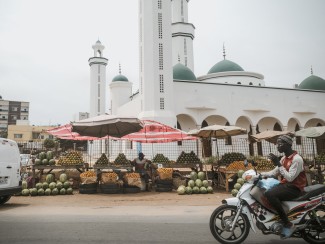Expanding and diversifying productive capacities will better position least developed countries (LDCs) to tap the financing and e-trade opportunities that will underpin their Covid-19 recovery. This was a recurrent theme in the United Nations Conference on Trade and Development (UNCTAD) Least Developed Countries Report 2020, which cautioned however that the international community must first rally with resources, policy space and better international support measures.
Covid-19 has exposed asymmetries in global trade and financing systems, with LDCs hit hardest. Falling demand and prices for LDC goods and services caused a slump in export earnings during 2020, placing targets to double LDCs’ share of global exports further beyond reach. Shrinking remittances depressed domestic consumption and threatened rural jobs. External debt-servicing costs grew while foreign direct investment projects (FDI) projects were cancelled and accessing private finance became harder. LDCs’ current account deficits have also widened at a time when official development assistance (ODA) volumes – the biggest source of capital inflows for many – appears under threat.
E-commerce presents an opportunity
E-commerce has represented one small bright spot throughout, with Rwanda and Senegal, for example, seeing existing players expand activities while new firms and services were established, the report found. Sellers in Bangladesh, Cambodia, Laos, Myanmar and Nepal have used Alibaba’s B2B platform to facilitate cross-border trade in agricultural products, food and beverages, textiles and crafts, while B2C mobile app-enabled platforms have boosted the sales of many small Ugandan traders.
But while global e-commerce sales are growing fast, LDCs account for 90 percent of the economies that have benefited least, the report noted. There are also concerns of a widening divide, with LDCs often lacking adequate digital architecture or skills to navigate the fourth industrial revolution.
A key benefit of e-commerce is that it could help integrate LDC exporters into regional and global value chains, as well as provide access to new markets, acknowledged Paul Akiwumi, Director of UNCTAD’s Division for Africa, Least Developed Countries and Special Programmes. But as with other digital and mobile technologies, too often it is used in LDCs for consumption rather than production.
LDCs can only fully benefit from e-commerce and digital trade facilitation efforts as part of a holistic package of domestic and international policies and strategies, he concluded. These should include:
Focus on productive capacities
Donor countries must resist an inclination to prioritize funding social investments, such as those related to health or education, at the expense of productive capacities. In 2015-17, 45 percent of ODA disbursements to LDCs were directed at social infrastructure and services, compared with 22 percent at productive capacity.
“There has to be a balance between the productive and the social sectors. There’s no point in providing good quality education, if there are no decent employment opportunities for those graduates.” Akiwumi noted.
The report highlighted an interdependence between traditional and new technologies, with hard and soft infrastructure unleashing the economic and developmental impact of digital technologies, which in turn provide opportunities for productivity improvements. UNCTAD eTrade Readiness Assessments suggest e-commerce growth is hindered by poor electricity access, weak postal systems and inadequate regulatory frameworks.
Create enabling environments for technology transfer
LDC governments should invest in enabling environments for digital transformation and upskilling. The report cited Uganda’s decision to commit around $9 million in its 2016/17 Budget to support innovations and technology research, plus another $4 billion to finance talented youth in ICT, as a positive example.
The use of public development finance in blended finance structures should be explicitly linked to real and documentable practices fostering technology transfer, according to the report.
LDCs must implement policies that put the needs of domestic firms first, Akiwumi added. Investment promotion schemes should include direct clauses aimed at facilitating meaningful technological and managerial transfers to local partners, as well as trainings to embed skills and boost the capacity of national firms.
Diversify and add value
International support and financial resources should be directed towards enabling LDCs to diversify their economies. This will improve their resilience and help them attract more competitive FDI.
LDC governments themselves should identify sectors and activities to build or revive, creating sound policies to attract private-sector development on fair terms and investing their own resources to kickstart the process, according to Akiwumi.
They should also encourage private-sector investors to look beyond quick-win sectors, such as extractive industries, that offer little value-added for LDCs, he added. Instead, resources should be directed towards creating productive capacities that link into existing production processes – such as developing leather production capabilities in Ethiopia to supply in-country footwear factories – or supporting strategically important sectors such as agro-processing.
Regional integration can also help attract FDI where it is most needed. The Africa Continental Free Trade Area (AfCFTA), for example, will enable African LDCs to expand their productive capacities and add more value to their output, Akiwumi said. UNCTAD’s recent Economic Development in Africa Report highlighted that intra-African trade hovered around 15.2 percent in 2015–2017. However, more value-added is gained from that trade than from the 85 percent of Africa’s exports that reach markets outside the continent. AfCFTA could also legitimize large volumes of informal cross-border trade, thereby boosting tax revenues.
Invest in financial services and mobilize domestic resources
Knowledge-intensive services such as finance and business services account for less than a fifth of tertiary services in African LDCs and Haiti, and island LDCs, leaving them ripe for development.
Banking and finance sectors in LDCs offer investment opportunities for private-sector players or donors that would support local firms and increase LDCs’ resilience, Akiwumi proposed. For example, with the creation of the Kigali International Financial Centre, Rwanda aims to establish a regional financial hub that will facilitate the flow of capital across Africa and support local businesses, including e-commerce activities.
LDCs must also be supported to expand and protect domestic financial resources, according to the report. The increased economic production resulting from expanding productive capacities would increase LDCs’ tax revenues, while fairer international taxation systems would protect LDCs from losses due to profit shifting by multinationals.
Overhaul international support measures
To address unfavourable terms of LDCs’ integration into the global economy, “international support measures need to be reviewed,” argued Akiwumi. “They have not produced the support that LDCs need.”
Any overhaul should see international support measures (ISMs) focus on strengthening LDCs’ institutional and regulatory capacity, especially in areas related to digital trade and trade in services. Non-tariff measures (NTMs) should receive particular attention as their impact often exceeds that of tariffs. New ISMs should also be redesigned to offer LDCs stronger protection from litigation over intellectual property rights and more flexibility in the application of rules of origin, Akiwumi added.
Greater support through the Aid for Trade initiative is also needed, if international support measures rooted in trade liberalization are to succeed, the report argued.
It also flagged asymmetries in financial systems that penalize LDCs and aggravate vulnerabilities. Stronger mechanisms for the provision of international liquidity, including a fresh injection of Special Drawing Rights, are essential for LDCs’ sustainable recovery from the crisis. The report called also for a “Marshall plan” with significantly increased aid flows, as well as renewed debt cancellation and the creation of a comprehensive framework for sovereign debt workout.
If you would like to reuse any material published here, please let us know by sending an email to EIF Communications: eifcommunications@wto.org.


